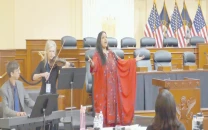Fake Sana Javed Facebook page overtakes the real one by millions of followers
Blue ticks don’t mean real anymore

The numbers themselves tell a story that borders on the absurd. A fraudulent Facebook account operating under the name of actress Sana Javed had attracted 1.7 million followers, half a million more than Javed's official page.
Verified through a paid subscription and complete with personal photographs and family images, the fake had not only infiltrated the digital ecosystem but also surpassed the original, according to express.pk.
For Sana Javed, a prominent figure in Pakistan's entertainment industry, the discovery was alarming. Through her Instagram story, she shared a screenshot of the impersonating account and asked a question that cut to the heart of the matter: how could such a page have received verification from Meta in the first place?
Her concern was not only about being misrepresented online but also about the potential damage to her reputation and to the trust of her followers. She appealed to her fans directly, urging them not to share or amplify any content originating from the fraudulent account.
Behind the statement lay a simple truth: for a public figure, control over one's digital identity is as crucial as control over one's career.
What made the account especially troubling was the fact that it bore a verification badge. Once a symbol of credibility and authenticity, the blue tick now operates under Meta's subscription service, available to anyone willing to pay a monthly fee.
While the system promises additional checks, the case of Sana Javed illustrates how easily such mechanisms can be manipulated.
The account, armed with Sana Javed's personal photographs and images of her husband, cricketer Shoaib Malik, mimicked authenticity convincingly enough to fool millions of users.
Its follower count rose to 1.7 million, overtaking her own verified Facebook presence, which stood at 1.2 million. For fans, the distinction between real and fake blurred. For Sana Javed, the situation raised larger questions about accountability: if social media platforms allow impostors to masquerade as celebrities, what safeguards exist for those being impersonated?
In response, Sana Javed lodged a report against the fraudulent page with Facebook itself and informed relevant authorities. Shortly after she brought the matter to light, the account was deactivated, but not before it revealed the scale of the problem.
Her case is not isolated. The rise of fake accounts on platforms such as Facebook, Instagram, and X (formerly Twitter) has created a parallel world where impostors build large followings, spread misinformation, and in some cases, exploit fans for financial gain. In Sana Javed's case, the concern centred on reputation and identity theft rather than fraud, but the implications remain significant.
The broader context is one of a digital landscape where impersonation thrives. Fake accounts are not a new phenomenon, but their sophistication and reach have expanded dramatically.
They are often armed with real photographs, family content, and in some cases, fabricated verification. With such tools, impostors gain credibility quickly, gathering followers who assume they are engaging with the genuine celebrity.
For public figures, the consequences range from reputational damage to a loss of direct control over their audience. For platforms, the persistence of fakes calls into question their commitment to safety and accountability. If a high-profile actress like Sana Javed can find herself outpaced by an impostor, the problem extends far beyond individual cases.
The episode also highlights the fragile relationship between celebrities and their fans. Trust, built through carefully curated engagement, can be easily eroded when false voices enter the conversation. A post shared from a fake account can misrepresent views, spread misinformation, or distort a public figure's image.
Sana Javed's direct appeal to her fans — asking them not to share posts from the fake account — underscored this vulnerability. It was a reminder that even in the digital age, where reach is measured in millions, credibility remains a delicate asset.
Meta's role in the affair raises uncomfortable questions. The company's verification process, once considered rigorous, has been weakened by the introduction of paid verification.
While subscription verification offers revenue, it also risks commodifying credibility. In Sana Javed's case, it enabled a fraudulent page to outshine the genuine one, creating confusion at scale.
Though the fake account was ultimately deactivated, the delay in action and the fact that it achieved verification in the first place point to systemic shortcomings. For celebrities, it means a constant vigilance against impersonation; for ordinary users, it increases the risk of being misled.
The incident illustrates more than a personal inconvenience for an actress. It reflects a broader pattern where digital impersonation undermines the integrity of online spaces.
As more public figures rely on social media for direct communication with audiences, the stakes grow higher. A fake account is not merely an annoyance; it is a challenge to authenticity, trust, and accountability.
The numbers — 1.7 million versus 1.2 million — remain striking. They illustrate the paradox of digital influence: authenticity does not always guarantee dominance. In this case, the fake eclipsed the original until it was exposed.
For platforms, the incident should serve as a warning. Verification must mean more than a subscription; it must carry weight, responsibility, and a commitment to protecting both users and public figures.
For fans, the episode is a reminder to question what they consume online and to verify sources before engaging. In an ecosystem where fake can appear more convincing than real, scepticism is no longer optional — it is necessary.
Sana Javed's ordeal with a fake Facebook account that amassed more followers than her genuine page is a cautionary tale about the fragility of authenticity in the digital era. It demonstrates how easily credibility can be manufactured and how quickly public trust can be manipulated.





















COMMENTS
Comments are moderated and generally will be posted if they are on-topic and not abusive.
For more information, please see our Comments FAQ